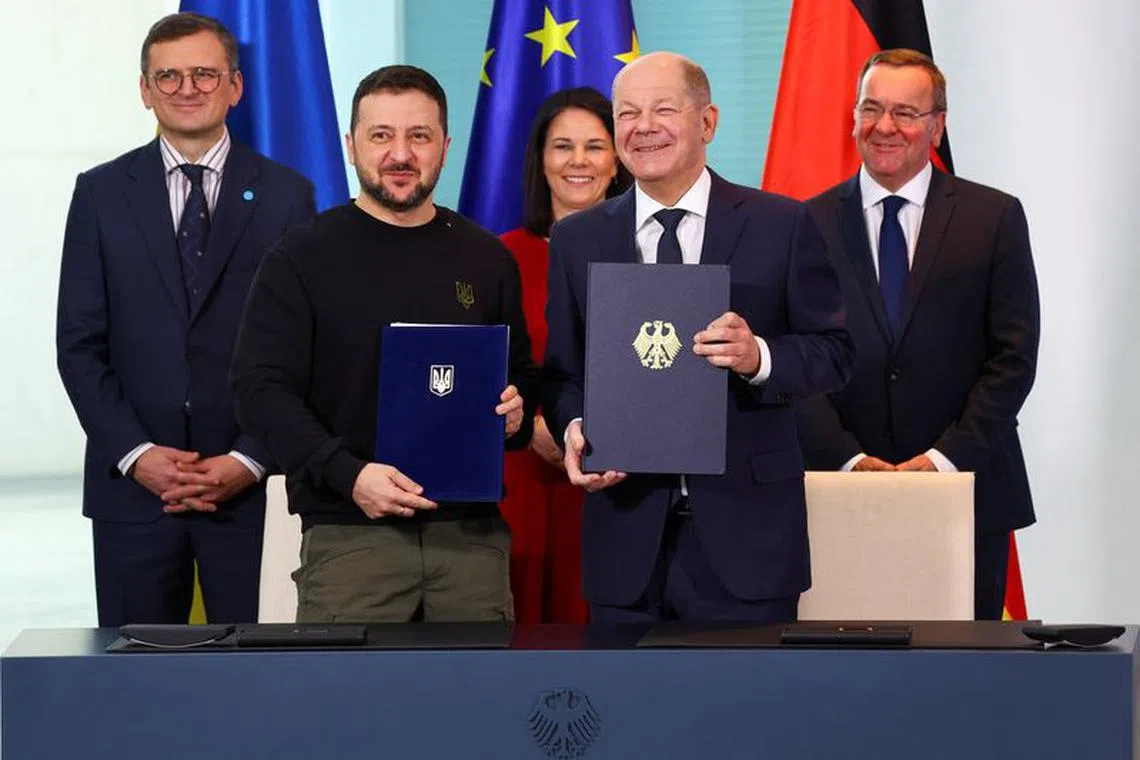Leaders of Germany, Ukraine sign security pact, condemn Navalny’s death
Sign up now: Get ST's newsletters delivered to your inbox

The security pact, which will last for 10 years, commits Germany to supporting Ukraine with military assistance and hitting Russia with sanctions and export controls, and ensuring that Russian assets remain frozen.
PHOTO: REUTERS
BERLIN - Ukrainian President Volodymyr Zelensky secured new military aid and signed a long-term security pact with German Chancellor Olaf Scholz in Berlin on Feb 16, in a meeting that was jolted by the news of the death of jailed Kremlin critic Alexei Navalny.
Mr Zelensky is visiting Germany and France in a tour to drum up military assistance at a critical point in the war against Russia, with Ukrainian troops trying to hold back Russian forces closing in on the eastern town of Avdiivka.
The security pact, which will last for 10 years, commits Germany to supporting Ukraine with military assistance and hitting Russia with sanctions and export controls, and ensuring that Russian assets remain frozen.
Berlin has also prepared another immediate support package worth €1.13 billion (S$1.8 billion)
“The document’s importance can not be overestimated. It makes clear that Germany will continue to support an independent Ukraine in its defence against the Russian invasion,” Mr Scholz said.
“And if in the future there is another Russian aggression we have agreed detailed diplomatic, economic and military support,” he added.
Mr Zelensky said the aid was critical as military supplies from other partners had decreased while Russia had an advantage in artillery on the front line.
News of Navalny’s death in Russian prison broke just before the two leaders were due to speak.
Navalny had spent time in Germany recuperating from poisoning with a military-grade nerve agent
“I met Navalny here in Berlin when he was trying to recover from the poisoning attack in Germany and also talked to him about the great courage it takes to return to the country,” Mr Scholz said.
“And he has probably now paid for this courage with his life,” he said.
Shifting challenges
Mr Zelensky landed in Germany as the war with Russia nears its third year. It marks his first foreign trip since he replaced his popular army chief and reshuffled his military command.
Germany became the second Ukrainian ally after Britain
“A new security architecture for Ukraine, as well as new opportunities. We are making every effort to end the war as soon as possible on fair Ukrainian terms and ensure a lasting peace,” Mr Zelensky said on social media as he landed in Germany.
Kyiv says the security arrangements with allies would in no way replace its strategic goal of joining Nato.
Mr Zelensky was also expected to give a speech at the Munich security conference on Feb 17. Several bilateral meetings on the sidelines are planned, including with US Vice-President Kamala Harris. REUTERS


